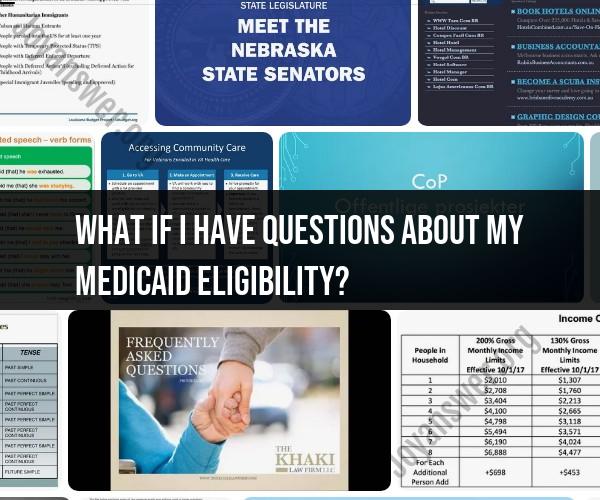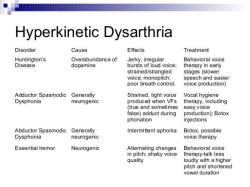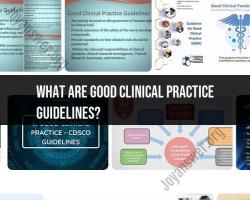What if I Have Questions about my Medicaid eligibility?
If you have questions about your Medicaid eligibility, it's important to seek answers and clarification to ensure you understand your coverage and benefits. Here are steps you can take to get the information you need:
Contact Your State Medicaid Office: Medicaid is a joint federal and state program, and each state administers its own Medicaid program. To get specific information about your Medicaid eligibility and coverage, contact your state's Medicaid office. You can typically find their contact information on your state's official government website or by searching online.
Speak with a Medicaid Representative: Call the Medicaid office and ask to speak with a representative or caseworker. They can provide you with information about your eligibility status, enrollment, benefits, and any other questions you may have. Be prepared to provide your Medicaid identification number or other relevant details.
Visit the Medicaid Office in Person: If you prefer face-to-face assistance, consider visiting your local Medicaid office in person. The staff can assist you with your questions, provide guidance on the application process, and help you understand your benefits.
Review Your Eligibility Notice: If you have received a notice of eligibility or denial, carefully review it for information about your coverage and the reasons for any denials. It may provide contact information for further assistance.
Consult with a Medicaid Enrollment Specialist: Some organizations, such as community health centers or nonprofit agencies, offer assistance with Medicaid enrollment and eligibility questions. These specialists can help you navigate the application process and understand your eligibility.
Use Online Resources: Many state Medicaid programs have websites with resources, FAQs, and eligibility calculators that can help answer common questions. These online resources can be a valuable source of information.
Seek Legal Assistance: If you encounter complex eligibility issues or believe you have been wrongly denied Medicaid coverage, consider seeking legal assistance from a qualified attorney or legal aid organization. They can help you navigate the appeals process if necessary.
Check Your Medicaid Handbook: If you are already enrolled in Medicaid, you may have received a Medicaid handbook or information booklet. These resources can provide information about your benefits, coverage, and how to access care.
Remember that Medicaid rules and eligibility criteria can vary by state, so it's essential to get information specific to your state's program. Additionally, Medicaid policies and regulations may change over time, so it's a good idea to stay informed about any updates that may affect your eligibility or coverage.
Questions About Medicaid Eligibility? Here's Where to Find Answers.
If you have questions about Medicaid eligibility, there are a few resources you can turn to:
- Medicaid.gov: The official Medicaid website provides a comprehensive overview of Medicaid eligibility, including state-specific information. You can also find a list of frequently asked questions and contact information for your state Medicaid agency.
- Healthcare.gov: Healthcare.gov can help you determine if you are eligible for Medicaid and other health insurance programs. You can also apply for Medicaid through Healthcare.gov in many states.
- Local Medicaid agencies: Your state Medicaid agency can provide you with specific information about Medicaid eligibility in your state. You can find contact information for your state Medicaid agency on the Medicaid.gov website.
- Community health centers: Community health centers are often a good resource for information about Medicaid eligibility and other health insurance programs. They can also help you apply for Medicaid.
Understanding Medicaid Eligibility: Where to Seek Clarification.
If you are still unsure about whether you are eligible for Medicaid, you can seek clarification from a number of sources:
- Medicaid eligibility screener: Many states have Medicaid eligibility screeners that can help you determine if you are likely to be eligible for Medicaid. You can find a Medicaid eligibility screener on the Medicaid.gov website.
- Medicaid advocate: A Medicaid advocate can help you understand Medicaid eligibility and apply for Medicaid. You can find a Medicaid advocate through your state Medicaid agency or through a local nonprofit organization.
- Financial assistance counselor: A financial assistance counselor can help you understand your financial options and apply for Medicaid. You can find a financial assistance counselor through your local community college or university.
Clearing Doubts: Resources for Addressing Medicaid Eligibility Queries.
There are a number of resources available to help you clear up any doubts you may have about Medicaid eligibility. Here are a few examples:
- Medicaid.gov FAQs: The Medicaid.gov website has a comprehensive list of frequently asked questions about Medicaid eligibility.
- Medicaid eligibility hotline: Many states have Medicaid eligibility hotlines that you can call to ask questions about Medicaid eligibility. You can find the contact information for your state Medicaid eligibility hotline on the Medicaid.gov website.
- Medicaid eligibility chat: Some states offer Medicaid eligibility chat services that allow you to chat with a representative about Medicaid eligibility. You can find the contact information for your state Medicaid eligibility chat service on the Medicaid.gov website.













